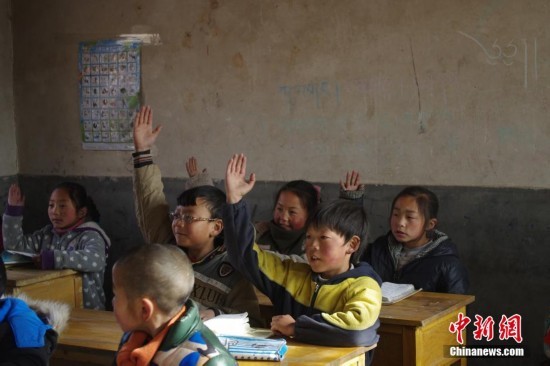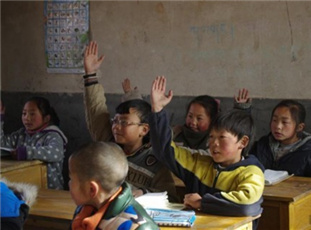Severe Teacher Shortages in NW China
china.org.cn / chinagate.cn by Zhang Ling, June 8, 2016 Adjust font size:

Researcher and graduate student Liu Wei from the School of Politics and Economics at SNNU found out that, like most schools in the northwestern regions, in Wangjiatun Village of Nijiaying Township in Linze County, Gansu Province, where the rural population is scarce and loosely scattered after the nation-wide rural school merger, primary schools in the village were closed, and students have to climb mountains to go to school far from their homes, forcing some children to drop out.
In some regions, more and more people consider it pointless to receive education. A mother from Gansu Province told research team members, “Whether children can climb up the educational ladder or not lies in the children themselves. If they can follow up, they can move on with further education; if not, then they should go back home supporting their families by farming, herding or working outside.” Previously, parents thought little of education, not allowing their children to receive education. Now, they let go of their children and do not care much in the whole process of schooling, and they solely rely on their children’s own merits and schooling.
Comparatively speaking, urban parents care more about infrastructure construction and teaching performance, yet rural parents pay more attention to whether schools can make their children behave or not. Rural parents are busy farming or working outside with little time to care about their children’s education, so they rely on schools for better student management and school administration.
Research team members realized children in most northwestern regions are very eager for knowledge. In Gulang County of Gansu Province, due to a backward local economy, receiving education is the only way out for children there, and both parents and children yearn for complete teaching facilities and good teachers. However, the actual educational resources, software and hardware, do meet their expectations for proper schooling. They feel hopeless, waiting for a miracle. The local minister of education pointed out helplessly, “we are too poor to afford teaching aids.”
A backwards economy begets educational backwardness and inconsistent talent training, which in turn hinders economic growth. There is an obvious gap in school infrastructure between rural and urban areas, for rural school building collapses are happening frequently. On the one hand, despite the fact that more dilapidated houses are transformed, each year, the number of dilapidated school buildings is still on the rise; on the other hand, lots of students have to live in boarding schools after their school mergers, but the living and catering conditions there are generally not that good.
The unbalanced development of basic education is also reflected in different areas and fields along the Silk Road.
The Sunan Yugur Autonomous County has implemented policies including the exemption of tuition fees, book fees, residence fees, a subsidy of living expenses and traffic fees, which also cover early childhood and high school education. As a result, 15 years of free education is available to children there. “Low commodity prices, affluent living, and a high sense of happiness breed more senior empty nesters and stay-at-home children in urban areas. In other words, young people feed animals in pasture area while leaving their elders and children in the cities.”
Sadly, aging teaching forces are more of a concern when compared with incomplete school infrastructure. What’s more, rural schools in particular do not pay due heed to ethical, physical and aesthetical education, coupled with the low utilization rate of educational resources, and a relatively low satisfaction level with school safety and security. All these aspects require our immediate attention.


